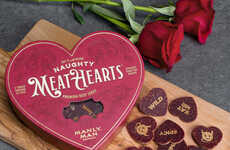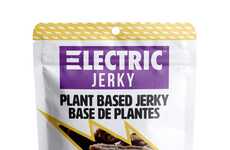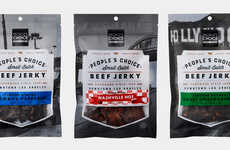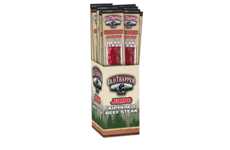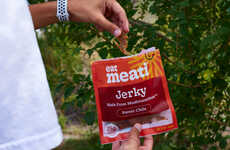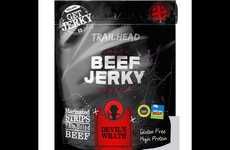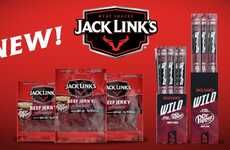
The Jason Mecier Meat Portraits are Made of Beef Jerky
Trenton Millar — September 12, 2012 — Pop Culture
References: facebook & laughingsquid
These Jason Mecier Meat Portraits are some of the more unconventional images that audiences have seen of America’s political rivals. Made from 80 bags of Jack Link’s Beef Jerky, each portrait took the artist approximately 50 hours to complete. Each portrait uses a variety of different jerky flavors; maybe this was to just get different shades, or maybe it was to represent the diversity of America.
The two Jason Mecier Meat Portraits have been aptly named ‘Barack Obameat’ and ‘Meat Romney.’ The two of them together definitely bring new meaning to the term “meatheads.”
This isn’t Mecier’s first time working with beef jerky. He has used the dried meat to create a picture of Sasquatch in the past. The pictures are really intriguing-looking, but a conflicting feeling of disgust comes when I think of the materials sitting on the canvas for an undetermined amount of time.
The two Jason Mecier Meat Portraits have been aptly named ‘Barack Obameat’ and ‘Meat Romney.’ The two of them together definitely bring new meaning to the term “meatheads.”
This isn’t Mecier’s first time working with beef jerky. He has used the dried meat to create a picture of Sasquatch in the past. The pictures are really intriguing-looking, but a conflicting feeling of disgust comes when I think of the materials sitting on the canvas for an undetermined amount of time.
Trend Themes
1. Meat Portraits - Creating portraits using unconventional materials, like jerky, offers a unique and disruptive approach to traditional art forms.
2. Food as Art - Exploring the intersection between food and art presents opportunities for innovative and boundary-pushing creations.
3. Unconventional Materials - Using unexpected materials in artistic endeavors can redefine creative expression and challenge conventional norms.
Industry Implications
1. Art and Design - The art and design industry can explore and embrace unconventional materials to create cutting-edge and visually captivating pieces.
2. Food and Culinary - Integrating food and culinary aspects into creative projects can expand the boundaries of both industries and lead to novel experiences for consumers.
3. Sustainable Packaging - Examining sustainable alternatives for packaging materials can help reduce waste and contribute to environmental conservation efforts.
1.2
Score
Popularity
Activity
Freshness


